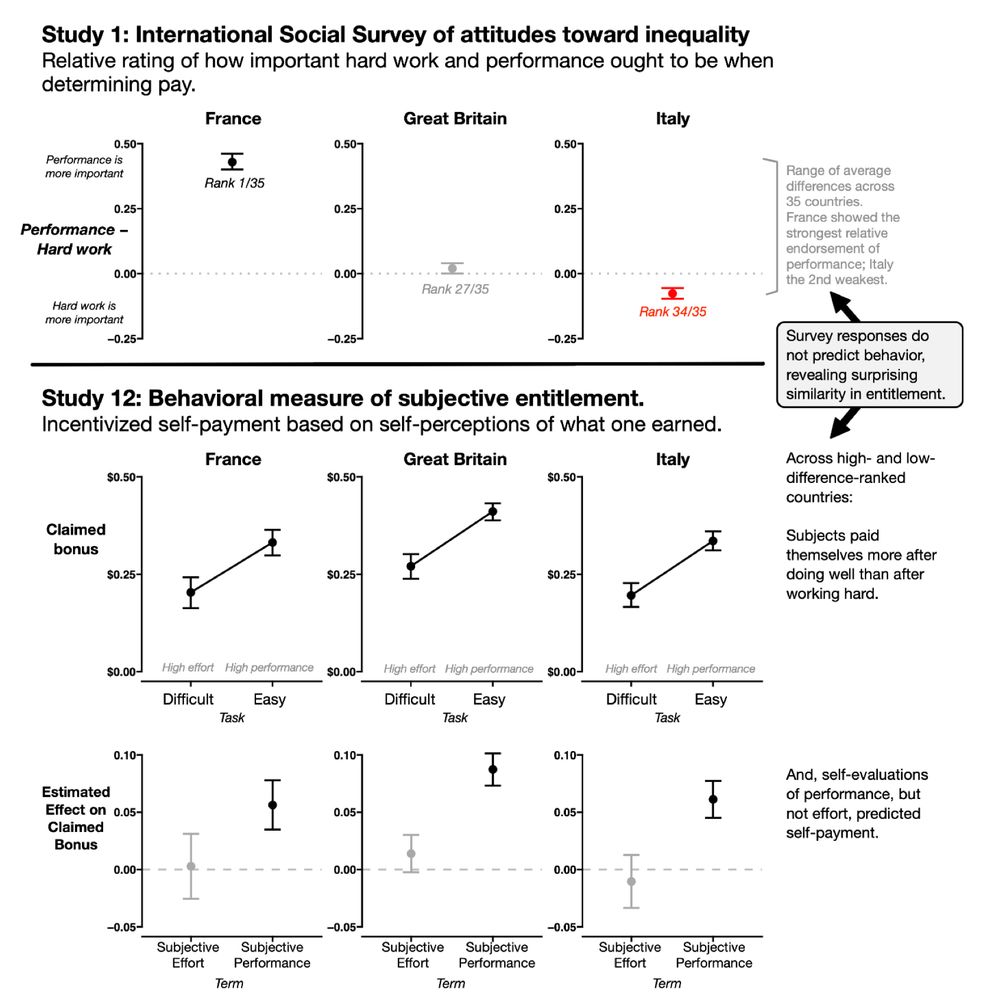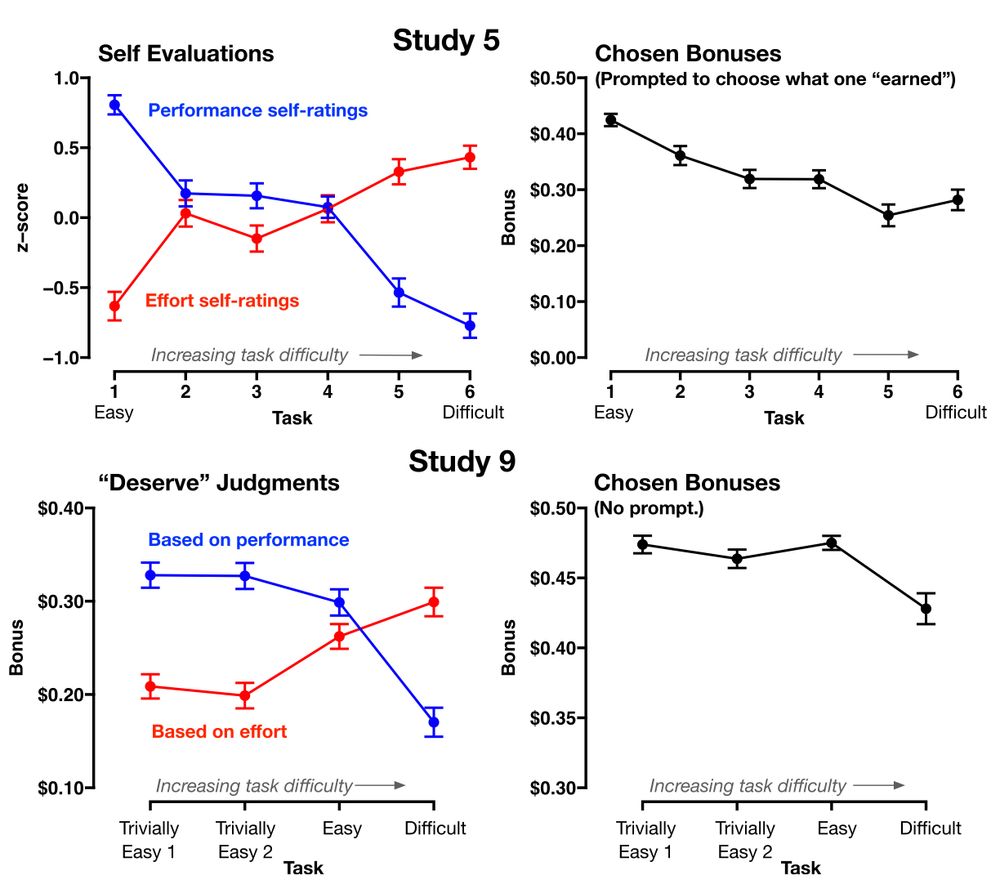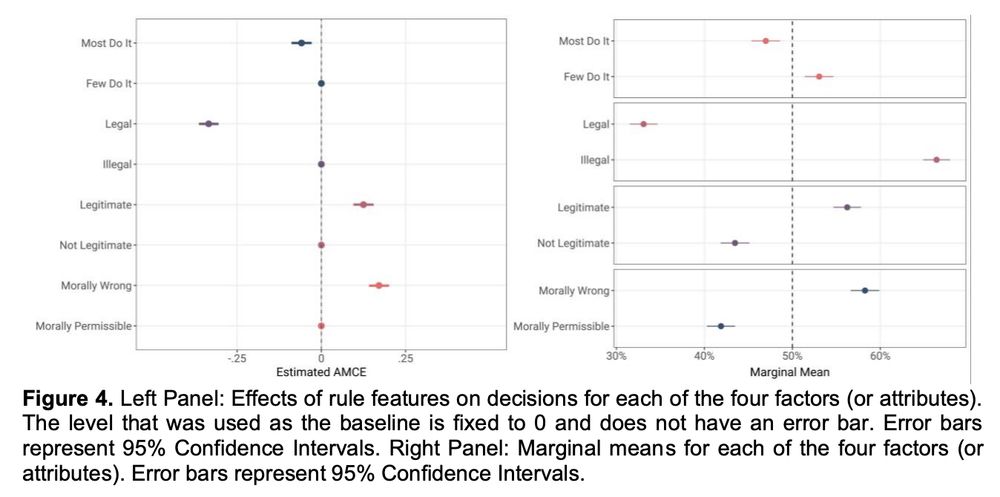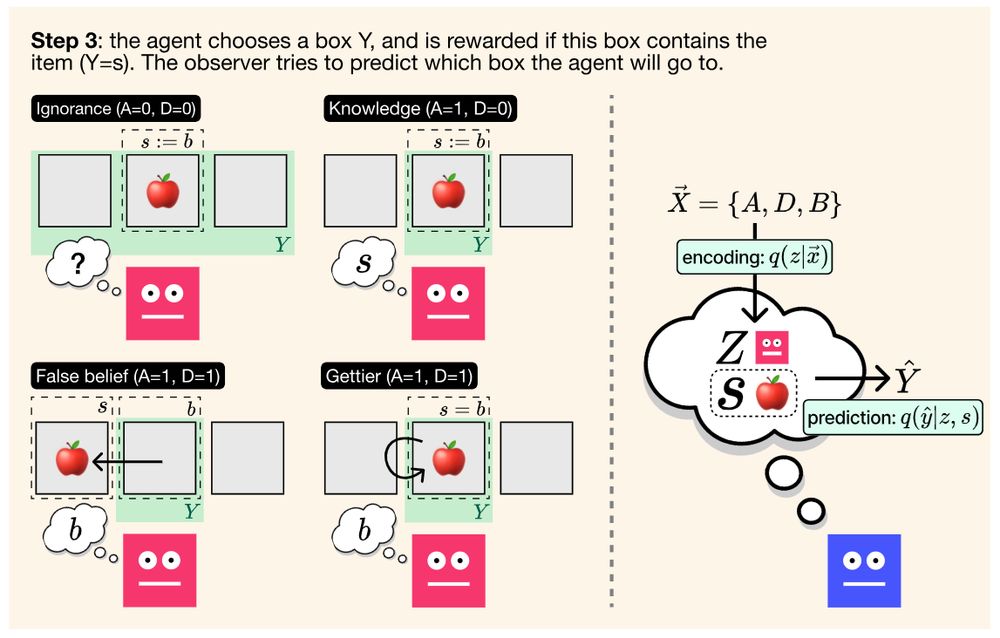Super cool! Congrats on the paper!
12.02.2026 19:55 — 👍 1 🔁 0 💬 0 📌 0

Why do otherwise rational people disagree about the same evidence? Our new paper finds that group membership is a deeply rooted influence on how we form beliefs, leading even preschoolers to bias their evidential standards and form inaccurate beliefs.
www.nature.com/articles/s41...
05.02.2026 16:56 — 👍 65 🔁 32 💬 3 📌 4
Today's SJDM Featured Paper is: Dietvorst, B. J. (in press). Understanding people's preferences for predictions: People prioritize being right over minimizing how wrong they are in expectation. Management Science. doi.org/10.1287/mnsc...
08.01.2026 13:32 — 👍 6 🔁 3 💬 0 📌 1
PNAS
Proceedings of the National Academy of Sciences (PNAS), a peer reviewed journal of the National Academy of Sciences (NAS) - an authoritative source of high-impact, original research that broadly spans...
A thread on our recent paper (w/Raihan Alam @raihanalam) in PNAS on why punishment often fails and what it means for crime, cooperation, democracy, and the rule of law. I’m super excited for it, it’s the lab’s most extensive experimental work to date. Check it out! 1/
www.pnas.org/doi/full/10....
19.11.2025 23:39 — 👍 40 🔁 15 💬 2 📌 2

Sage Journals: Discover world-class research
Subscription and open access journals from Sage, the world's leading independent academic publisher.
🚨From Jay Naborn & Jonathan E. Bogard:
The Pick-the-Winner-Picker Heuristic: Preference for Categorically Correct Forecasts
05.11.2025 13:58 — 👍 1 🔁 1 💬 0 📌 0

Excited by our new work estimating the empowerment of LLM-based agents in text and code. Empowerment is the causal influence an agent has over its environment and measures an agent's capabilities without requiring knowledge of its goals or intentions.
01.10.2025 04:27 — 👍 17 🔁 2 💬 3 📌 0

The Great Implicit Bias Bamboozle
Where were you when you first learned about implicit bias?
Major new paper by finds implicit measures like the IAT are no better than asking people directly about their biases. After decades of avoiding self-reports, turns out our sophisticated replacement tools work no better than what we abandoned. New post!
10.09.2025 12:46 — 👍 69 🔁 25 💬 2 📌 3
That's just two possibilities. There are a ton of others that my coauthors and I have thought about.
But we haven't actually tested entitlement in students yet. Do either of those possibilities resonate with you? Or, do you have any other ideas?
09.05.2025 19:04 — 👍 1 🔁 0 💬 1 📌 0
Or, maybe these students don't *really* feel entitled to a higher grade, they just think they can *get* one by appealing to effort. When I show these kinds of students how much better other students performed relative to them, they typically drop their appeals.
09.05.2025 19:04 — 👍 1 🔁 0 💬 1 📌 0
One thing that might be going on is that students who work hard think that their performance actually is better than the teacher says it is. (After all, overachievers are used to their hard work resulting in high performance.) So, the appeals could be about performance (deep down).
09.05.2025 19:04 — 👍 1 🔁 0 💬 1 📌 0
Hi Dave! I totally share your intuition here. It is possible that students feel differently about their grades than adults feel about, e.g., pay and bonuses.
But, maybe the student case isn't such a clear counter-example either. I'm curious what you think:
09.05.2025 19:04 — 👍 1 🔁 0 💬 1 📌 0
When we started, we expected the opposite results: Hard work marks us as virtuous. Achievement, even though it creates value for others, is often a product of luck.
Our intuitive sense of entitlement may not care about how lucky we are, only whether we succeed at the work we do for others.
08.05.2025 21:51 — 👍 2 🔁 0 💬 1 📌 0

These findings were robust!
Workers paid themselves based on outcomes (not effort) even when they knew that others weren't working as hard as they were.
We also replicated this result across cultures who, in other surveys, appear to differ in the value of hard work and achievement.
08.05.2025 21:51 — 👍 1 🔁 0 💬 1 📌 0

We gave online workers short jobs to do. We varied how much effort the job induced, and how good a job the workers could do on it.
We then let workers choose their bonus for their work (which we then paid them).
Workers paid themselves based on how good they did, not how hard they worked.
08.05.2025 21:51 — 👍 1 🔁 0 💬 1 📌 0

What makes people feel entitled to rewards—the effort they put into their work or the outcomes they achieve?
Out now in PNAS; with Jin Kim and Jared Wong:
Achievement.
Effort seems to matter very little (if at all).
www.pnas.org/doi/10.1073/...
08.05.2025 21:51 — 👍 56 🔁 17 💬 5 📌 2

Really proud of this new work out @psychscience.bsky.social. Led by the amazing but bluesky-less Amanda Geiser and with @deborahsmall.bsky.social.
We show that when comparing moral wrongs, people are (much) more willing to “scale up” than to “scale down” condemnation and punishment…
22.03.2025 18:20 — 👍 43 🔁 18 💬 1 📌 1

Our incredibly short (5 page) paper on intuitions about consent — with Joanna Demaree-Cotton and @rosesomm.bsky.social
We find cases where people agree that both:
(a) There’s a sense in a which a person clearly consented
(b) In deeper sense, she did not consent at all
osf.io/63d8s
26.02.2025 14:58 — 👍 17 🔁 10 💬 0 📌 1
There hasn’t been nearly enough appreciation for this amazing paper by Clark Barrett and
@rebeccasaxe.bsky.social
Anthropologists have observed people in certain cultures blaming agents for behavior without regard to mental states (intent, knowledge, etc.). Why does this happen?
14.02.2025 19:57 — 👍 31 🔁 13 💬 2 📌 1

New paper in Psychological Review!
In "Causation, Meaning, and Communication" Ari Beller (cicl.stanford.edu/member/ari_b...) develops a computational model of how people use & understand expressions like "caused", "enabled", and "affected".
📃 osf.io/preprints/ps...
📎 github.com/cicl-stanfor...
🧵
12.02.2025 18:25 — 👍 57 🔁 17 💬 1 📌 0
spooky accuracy.
08.02.2025 13:01 — 👍 0 🔁 0 💬 0 📌 0

When someone only has one sensible option available, do they have a choice at all? @cusimano.bsky.social and @tanialombrozo.bsky.social explore how we experience freedom: https://buff.ly/4gj0njy
23.01.2025 18:26 — 👍 5 🔁 3 💬 0 📌 0
APA PsycNet
Our paper on if you can incentivize rule induction in humans with money is finally out (answer is: it appears to be a very weak/0-ish effect in contrast to the huge effect of financial incentives on rote, repetitive tasks). credit to pamop, ben newell & dan bartels psycnet.apa.org/fulltext/202...
21.01.2025 17:06 — 👍 16 🔁 7 💬 0 📌 2
Good opportunity to work with some amazing scholars!
18.01.2025 17:45 — 👍 1 🔁 0 💬 0 📌 0

what counts as breaking a rule? you might think this q is easy, but people actually integrate signals from morality, legality, punishability, and normativity to figure it out, new preprint w/ @jowylie.bsky.social & dries bostyn osf.io/preprints/ps... #psychscisky #cognition #socpsyc #philsky
03.01.2025 17:22 — 👍 43 🔁 20 💬 2 📌 1
Philosopher, UC Riverside. Father. Human.
Psychology Postdoc at the University of Toronto
Behavioral Scientist studying self-control and motivation. Assistant Professor at Boston University
PhD student in Psychology at Princeton
studying how people make sense of right and wrong
Moral psychology & experimental jurisprudence. Interested in mental state attributions, risk, punishment, personal identity, criminal law & procedure, constitutional & statutory interpretation, statistics, etc., etc., etc. christianmott.com
Social psychologist at Ohio University studying counterfactuals, regret, free will, nostalgia, and conspiratorial thinking. Star Trek nerd. Anti-fascist. Trying to do something kind every day.
social psychologist (@LMU Munich) fascinated by antisocial behavior
Jun. Professor for Big Data in Psychology at Leibniz Institute for Psychology (ZPID) and U of Trier | PI Moral Computing Lab | https://fhopp.github.io
Cognitive Psychology PhD Student at the University of Michigan | Researching reasoning, judgment and decision making 🧠
Assistant Professor of Management & Organization at University of Southern California, Marshall School of Business.
Web: https://zachariahberry.com
Associate Prof of Psychology. I study how you remember (episodic memory), but am also interested in other areas of science (astronomy, geology, astrophysics, paleobiology, ecology, meteorology, etc) and other things too (architecture, birds, transit, etc).
Postdoctoral Researcher at The Ohio State University studying intellectual humility, political psychology, conflict resolution, and trust in science
Postdoc in the Behavioral Decision Making area at UCLA Anderson. I study ethical decision making and social norms.
I study how people solve big problems with small brains. Starting at Dartmouth in 2026—I'm recruiting!
https://fredcallaway.com
Roses are red, rabbits eat kale. I’m studying for a PhD at Yale.
Social Cognition • Comparative Cognition • Theory of Mind
https://amandaroyka.github.io/
Social psychologist. Thinks about groups, conflicts, power, and ideology. EIC. Human and dog mom.
Cognitive Scientist--studying how people think about things they can't see
Postdoc in Anthropology at Stanford
Ph.D. in CogSci/Psych from IU Bloomington
https://www.eleanorschillehudson.com/
I love hobbies ✨
Prof @ University of Leipzig, Institute for Communication and Media Studies & Institute for Political Science (Private account & personal opinions, of course.)



















